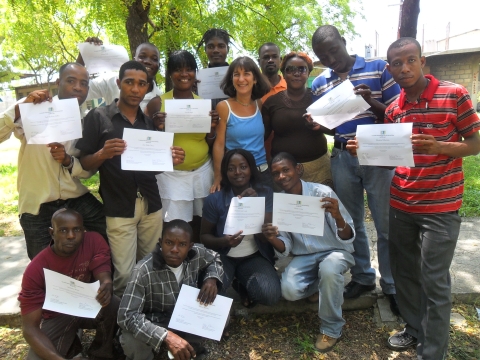
Kathie Klarreich, center, is surrounded by journalists from the Association of Young Journalists for a Better Tomorrow who participated in a 2-month investigative journalism training program to track the aid coming into earthquake-wracked Haiti.
To say that Haiti is full of surprises is kind of like saying that summers here are hot. Surprises are as numerous as Haiti’s contradictions: two hundred dollar a night hotels across from tent camps, five-star restaurants facing water distribution points.
Many of the surprises provoke mixed emotions, like when I turn the corner only to find myself in a traffic jam because a pickup truck is finally removing rubble. Or a street that was passable the day before now has a new pile of debris, higher and wider than the one that was cleared.
Then there are the surprises that I know should not surprise me but what can I say, they do: people not showing up when they’ve promised they’ll do an interview with one of my journalists. Or I finally secure an interview with a government official after weeks of hounding and the radio journalist shows up without her tape recorder (true story, I’m afraid).
But then there the surprises that make me forget all the other ones, the surprises that remind me why, despite the inconveniences and frustrations, there’s an immeasurable satisfaction in working here, particularly training Haitian journalists.
On the occasion of International Freedom of the Press Day May 3rd, which is celebrated here with vigor and esteem, I received an email from a group of journalists that I had worked with for two months, the Association of Young Haitian Journalists Working for a Better Tomorrow (ACCJAH). The members did not produce an investigative report by the time the training was over, but they inhaled every single minute of every training I did with them. They showed up on time, they followed through on their commitments, and they did everything short of beg to extend the training past the two-month commitment. At the last session, each member stood up and delivered a speech that literally left me speechless, as did their email (translated from Creole):
Today, May 3, 2011, the day to celebrate International Freedom of the Press, all members of AJJCAH extend a deep bow to acknowledge you for your courage, determination and the knowledge that you have offered, not just to the Haitian journalists to make their work more professional, but to the media in general.
In this sense all the members of AJJCAH would like to say that they will never forget you and even if you are no longer living here we will continue to let the Haitian people know about the support you have given to advance the Haitian press. If you see that we have not produced our reports it’s because we haven’t yet gotten the cooperation we need from the appropriate institutions but we are continuing to work on them. We won’t give up, our dream is to go all the way.
I wasn’t expecting this email any more than I was expecting their initial thanks, but it’s a gift I will carry around in my heart, especially on the days when other surprises throw me off course. It will remind me that when so many of the international agencies are packing up now that the ‘emergency’ is over, when most of the international press has walked away because reporting on Haiti is no longer ‘sexy’, these journalists, with the skills they’re learning from the investigative reporting workshops, will still be here. And they’ll be better equipped to tell their story because it is, after all, their story to tell.